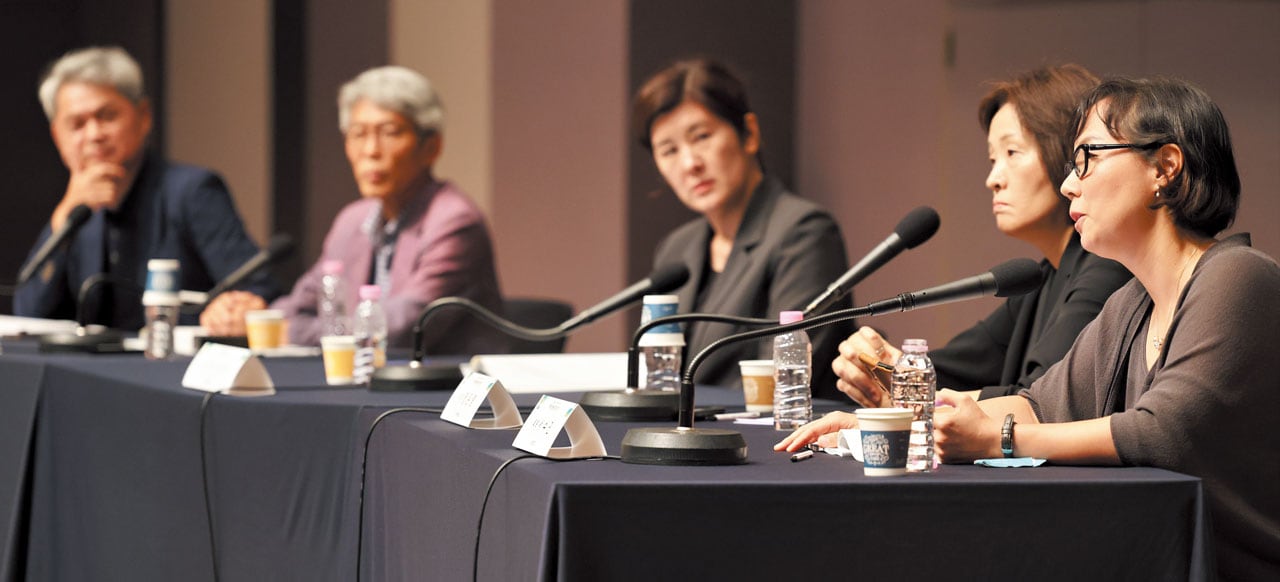Judul : Democratic Party's punitive damages push sparks media gag fears
link : Democratic Party's punitive damages push sparks media gag fears
Democratic Party's punitive damages push sparks media gag fears

Veteran journalists currently working in the media industry and researchers affiliated with academia gathered to discuss ways to restore journalistic values. At a joint seminar hosted by the Kwanhun Club and the Korean Communication Association, held at the Korea Press Center in Jung-gu, Seoul, on the 17th under the theme "How to Protect the Media," criticisms poured in regarding concerns over the ruling party’s push for a "punitive damages system," as well as the drawbacks of commercialized portals, the race for breaking news, and the media’s entanglement in partisan logic.
Kang Ji-won, head of the Culture Department at Hankook Ilbo and the first presenter in the session titled *Restoring Trust in Journalism: The Nature of the Media Crisis and the Way Out*, stated, "If punitive damages become possible, excessive litigation by political circles could stifle reporting on suspicions surrounding those in power." He added, "Such legislation must simultaneously achieve the suppression of false information and the prevention of weakened oversight." The current amendment proposed by the Democratic Party’s Special Committee on Media Reform aims to introduce punitive damages of up to 3–5 times the amount of damages for false or fabricated reporting. However, clauses allowing media outlets to be held responsible for false reporting based solely on gross negligence, even without proven intent, have been criticized as poison pills.
Yoon Seok-min, a professor at Seoul National University who presented on the topic of the "media crisis," remarked, "Some media outlets are creating negative perceptions about the entire press by citing the bias and low quality of certain outlets, even spreading the notion that the media is an obstacle to democracy rather than its foundation." He continued, "The idea that media reform should be led by political power is no different from media control by those in power." He pointed out, "The Korean media is undoubtedly in crisis as it fails to properly fulfill its role, such as checking political and economic power," adding, "This is because the media has failed to innovate adequately in an era of rapid technological advancement."
Lee Jong-gyu, head of the Journalism Accountability Office at The Hankyoreh, noted, "Power figures, including politicians, habitually label reports as ‘fake news’ when suspicions are raised, yet they fail to explain what exactly is false." He added, "This process leads to a vicious cycle of declining trust in the media." Jeong Woo-sang, an editorial writer for Chosun Ilbo, stated, "Political power has always found the media bothersome; we must be wary of the impulse to silence the press under the guise of ‘media reform.'" He emphasized, "Now is the time to halt the industry’s self-destructive competition and build a foundation for cooperation."
There were also voices questioning how strict the media has been with itself before calling to "protect the press." Jeong Eun-ryeong, a professor at Semyung University, pointed out, "Fact-checking is not merely a technical skill but a highly specialized domain requiring expertise and creativity, yet this function is gradually weakening within media outlets." She added, "In the changing media environment, we must reflect on whether the pressure for speed and profit has driven media companies to peddle opinions and adopt mechanical neutrality."
In the session on "Online News Distribution Governance," alternatives to improve the media’s dependency on portals were proposed. Kim Kyung-tae, a director at MBC, suggested, "Creating a ‘News Suppliers Association’ model centered around public and quasi-public broadcasters could enhance transparency in news distribution by disclosing algorithms and implementing joint curation, thereby countering portals." Kim Jeong-geun, head of the Media Strategy Office at Kyunghyang Shinmun, expressed concern, stating, "With 45% of online revenue coming from portals and 87% of that dependent on Naver, media outlets have no choice but to rely on Naver." He added, "Another portal similar to Naver could emerge."
Bae Jin-ah, head of the Korean Communication Association, explained the seminar’s purpose: "The value of factual reporting is shaken as truth and falsehood become intertwined, and the platform-centric distribution structure has placed the media’s independence in crisis." She emphasized, "The media should not be seen as an object of reform but as a public asset that society must protect."
Thus the article Democratic Party's punitive damages push sparks media gag fears
You are now reading the article Democratic Party's punitive damages push sparks media gag fears with the link addresshttps://www.unionhotel.us/2025/09/democratic-partys-punitive-damages-push.html
0 Response to "Democratic Party's punitive damages push sparks media gag fears"
Post a Comment